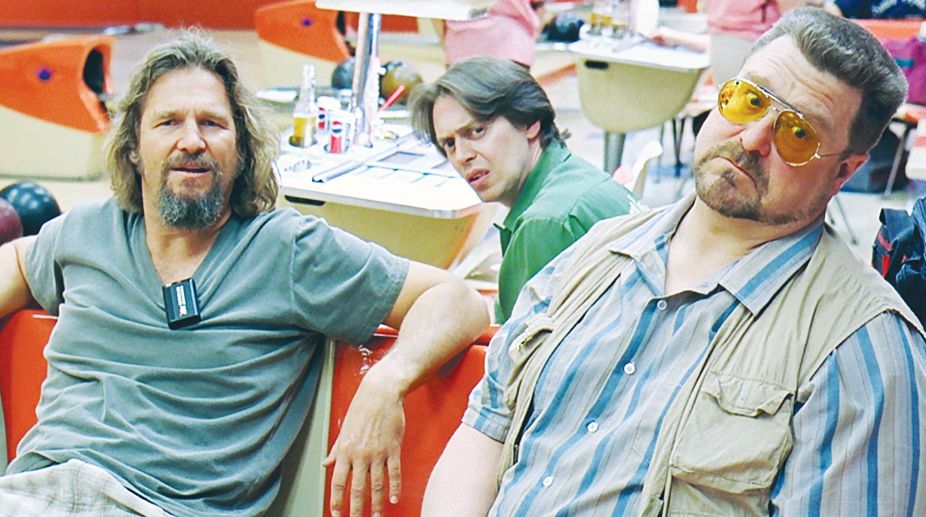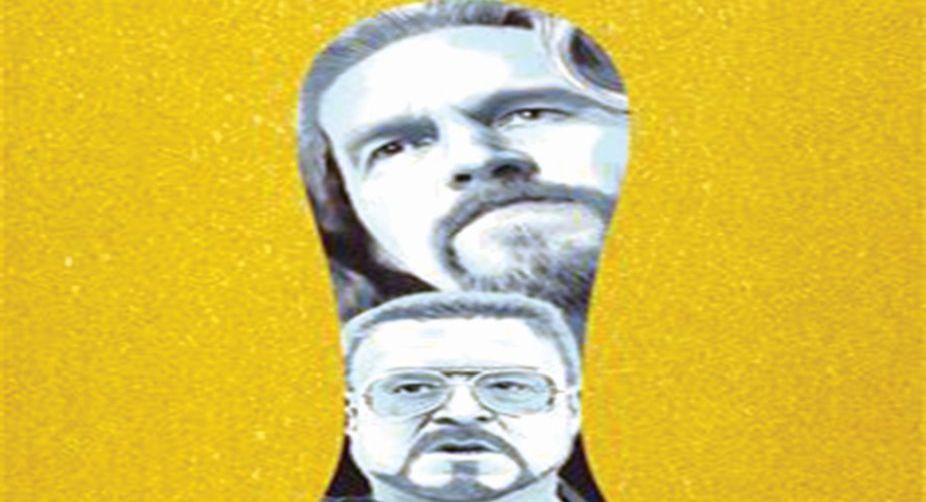Ed Westwick spotted in Mumbai, excited for India-Pakistan cricket showdown
Beyond cricket, there’s more excitement in Westwick’s personal life. The actor and his wife, actress Amy Jackson, are expecting their first child together.

Jeff Bridges as “The Dude” hangs out at the bowling alley with his buddies Walter (John Goodman) and Donny (Steve Buscemi). Courtesy Universal Studios.
In 2007, almost a decade after the release of The Big Lebowski, a book was written about the film’s legacy. Joel and Ethan Coen, the filmmakers responsible for the cult classic, contributed just one line. The tome’s first sentence, in reference to the writing of the book, reads simply, “They have neither our blessing nor our curse.”
It’s a typically Coenesque response to the enduring appeal of the movie, the brothers having repeatedly reiterated their confusion at the way Lebowski seems to have taken on a life of its own.
Advertisement
The movie’s star, Jeff Bridges, one of the finest actors of his generation, is less perplexed. The Oscar winner is on record as saying, “Someone asked me, ‘How would you feel at the end of your career if the role you were most famous for was The Dude?’ ‘I’d be f**king delighted,’ I told him.”
Advertisement

The story of The Big Lebowski, released twenty years ago, almost to the day, starts with the failure of The Hudsucker Proxy, the Coen brothers’ 1994 attempt at a big budget family comedy. A bid for mainstream acceptance buoyed by a brilliant performance from a bona fide star (Paul Newman), Hudsucker was a major flop at the box office.
For their next project, the Coens returned to their roots and made Fargo, a darkly comic thriller set in and around the Minnesota of their childhoods, for just $7 million. Fargo was a critical and commercial hit, won two Oscars and spawned an acclaimed television series.
Years later, Ethan commented, “If we’d had to predict in the abstract, which would be the more successful, Fargo or Hudsucker, we would have certainly bet on Hudsucker. Fargo seemed like a very obscure, regional exercise. In fact, Hudsucker made less than any other film we’ve released, and Fargo made the most. It’s just very, very hard to predict.”
Or, in the words of Hollywood titan William Goldman, “Nobody knows anything… Not one person in the entire motion picture field knows for a certainty what’s going to work.”
After a decade and a half as cult favourites, the Coens suddenly discovered they were industry darlings. The obvious next move would be to make a picture in the vein of Fargo and capitalise on the renewed interest in their work. The siblings have never been too interested in such things, however, and followed up with a rambling shaggy-dog story about an unemployed stoner and his attempts to replace a rug that is “micturated” on in the film’s first few minutes. In Ethan’s words, “If a movie like Fargo succeeds, then clearly nothing makes much sense. You might as well make whatever kind of movie you want and hope for the best.”

Inspired in equal parts by Raymond Chandler and Cheech and Chong, The Big Lebowski was a box office disappointment and received mixed reviews (although credit to Ian Nathan, whose five-star Empire write-up concluded with the maxim, “In a perfect world all movies would be made by the Coen brothers.”)
Like other modern comedy classics such as Withnail and I and This Is Spinal Tap, the plot is almost beside the point. The characters are so expertly drawn that repeat viewings are essential to fully appreciate the sheer number of hilarious players.
Bridges, John Goodman and Steve Buscemi are sensational in the leads with their unusual quasi-family dynamic, but there is something to savour in every scene, from the taxi driver with an unhealthy affection for the music of The Eagles to John Turturro’s hysterical turn as Jesus Quintana.
Like Withnail, this is a film that is dismissed by detractors as studenty, perhaps as a result of the protagonist’s propensity to drink white Russian cocktails and smoke joints (Bridges has stated that he would frequently ask the filmmakers before shooting a scene, “Did the Dude burn one on the way over?”).
In reality, it’s packed with some of the most quotable lines and funniest characters in celluloid history but also possesses a depth most comedies can’t match. It is not for nothing that this has become one of the most beloved movies of the last few decades.

The Big Lebowski, released in 1998 but set in 1991, is a film about the recent past. The Dude harks back to the golden age of the hippies a few decades earlier while Goodman’s Walter is obsessed with his experiences in Vietnam and his ex-wife. The bowling alley at the heart of the action, aesthetically stunning, recalls the halcyon days of the 1950s.
Fargo famously opens with text claiming that the events of the film are entirely true, although Joel later conceded, “The only thing true about it is that it’s a story.” Lebowski, however, did actually have basis in fact despite no such on-screen claims.
When promoting their debut feature, Blood Simple, the Coens met one Jeffrey Dowd, a man who had been a member of the Seattle Seven, drank White Russians and was referred to almost exclusively as The Dude. The writer and director John Milius, most famous for scripting Apocalypse Now, formed the basis for the Walter character both in appearance and character, not least his enthusiasm for guns and obsession with all things militaristic.
Perhaps the reason this film has become the Coens’ most popular, spawning an annual festival called Lebowski Fest at which fans of the film (“Achievers” in the parlance of our times) attend dressed as their favourite characters, is its warmth. The siblings have often been accused of cynicism in their work but, even after a moment as bleakly hilarious as Walter inadvertently covering The Dude with cremated remains, there is heart; the pair share a beautiful hug and head off bowling.
It is the Coens’ funniest film and as such will never be as popular with critics and academics as the likes of Miller’s Crossing and No Country for Old Men. Such detractors might claim it is a minor work from the masters but let them disagree all they want, us Achievers have the perfect riposte, “That’s just, like, your opinion, man.”
The independent
Advertisement